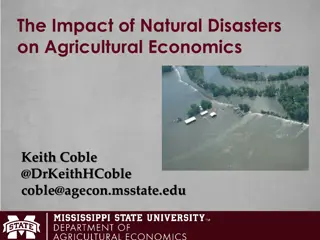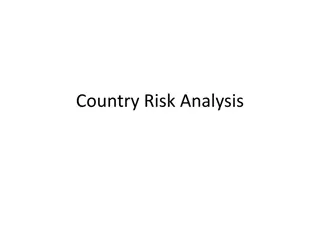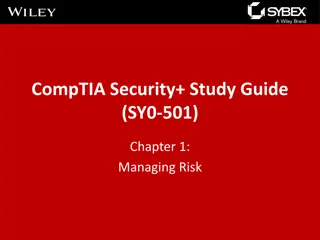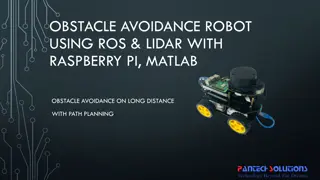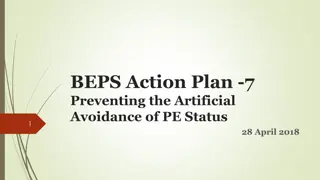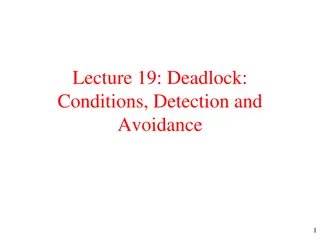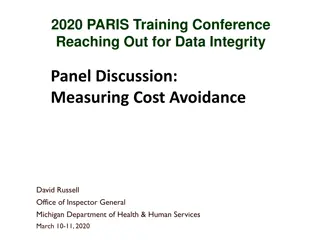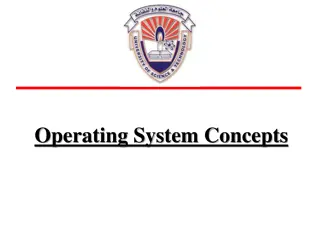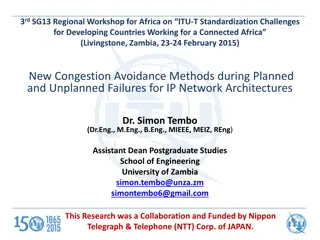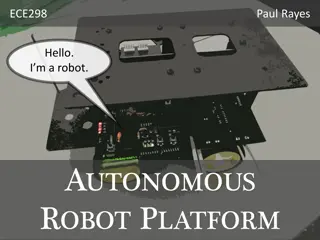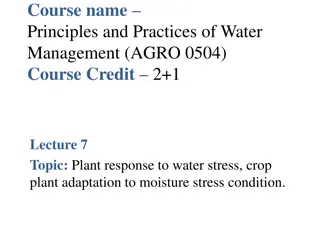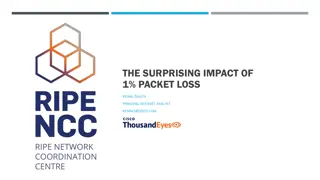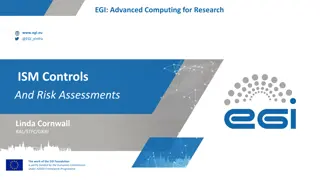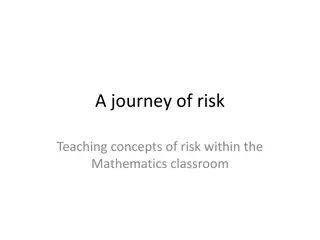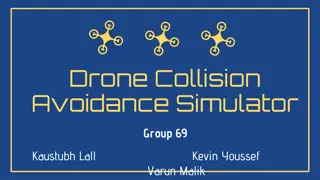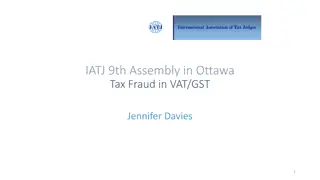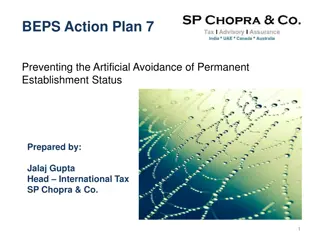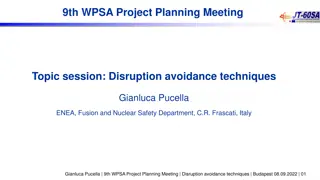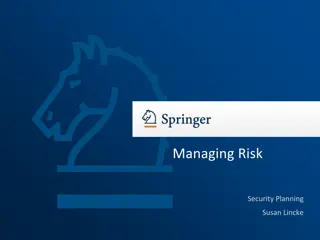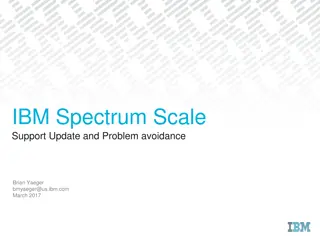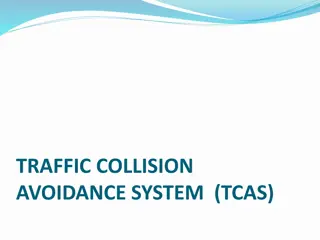Understanding Risk Management in Environmental Geography and Disaster Management
Risk management in environmental geography and disaster management involves assessing the potential losses from hazards, evaluating vulnerability and exposure, and implementing strategies to mitigate risks. It includes calculating risk, dealing with risk through acceptance, avoidance, reduction, or
1 views • 10 slides
Introduction to Flood Risk Assessment with HEC-FDA Overview
This presentation delves into flood risk assessment using HEC-FDA software, covering topics such as defining flood risk, components of uncertainty, consequences of flood risk, and methods to assess flood risk including hydrology, hydraulics, geotechnical, and economics. It explores the intersection
6 views • 39 slides
Understanding Agricultural Risk Management in the Face of Natural Disasters
Exploring the impact of natural disasters on agricultural economics, this content delves into the challenges faced by farmers and the approaches available for managing risks. From analyzing the Billion-Dollar Disasters in the US to discussing private and public risk management provisions, the conten
3 views • 20 slides
Understanding Country Risk Analysis in International Business
Country risk analysis is crucial for multinational corporations (MNCs) to assess the potential impact of a country's environment on their financial outcomes. It includes evaluations of political and economic risks in foreign operations. Sovereign risk, political risk characteristics, and factors are
1 views • 61 slides
Understanding Emotionally Based School Avoidance in Children and Young People
Emotionally Based School Avoidance (ESBA) is a common issue among children and young people, leading to school attendance concerns. This article sheds light on the diverse presentation of school avoidant behaviors, effective strategies for addressing them, and the prevalence of anxiety and stress as
1 views • 42 slides
Project Risk Management Fundamentals: A Comprehensive Overview
Project risk management involves minimizing potential risks and maximizing opportunities through processes such as risk management planning, risk identification, qualitative and quantitative risk analysis, risk response planning, and risk monitoring and control. Quantitative risk analysis assesses t
0 views • 41 slides
Understanding Different Types and Classifications of Heliports
Heliports, helidecks, helistops, and helipads serve as key landing areas for helicopters. They come in various classifications including military, federal, private use, public use, commercial service, and personal use. Factors influencing site selection include traffic considerations, obstruction av
0 views • 21 slides
Risk Management Strategies in Organizational Security
Exploring risk management in organizational security, this study guide delves into resiliency, automation strategies, policies, and procedures to reduce risk. It covers threat assessments, computing risk assessments, qualitative vs. quantitative risk measurements, and actions based on risk assessmen
1 views • 19 slides
Autonomous Obstacle Avoidance Robot Using ROS, Lidar, and Raspberry Pi with Matlab Path Planning
Obstacle avoidance in robotics has evolved from basic collision avoidance to autonomous path planning with the use of Lidar and ROS. This project involves mapping the environment using Lidar scans and implementing a path planning algorithm in Matlab to navigate around obstacles. By utilizing a Raspb
0 views • 15 slides
Preventing Artificial Avoidance of PE Status in International Business: Case Studies & Exemptions
Explore case studies on Agency PE and Preparatory/Auxiliary Services, along with PE exemptions for specific activities to prevent the artificial avoidance of Permanent Establishment status in the global tax landscape.
2 views • 14 slides
Understanding Deadlock: Conditions, Detection, and Avoidance
Explore strategies for dealing with deadlocks, from detection and recovery to dynamic avoidance. Learn about deadlock avoidance methods like being conservative in resource granting and dive into safe and unsafe states, the Banker's algorithm, and the four conditions for deadlock. Discover how to pre
0 views • 15 slides
Michigan OIG: Cost Avoidance and Investigation Types Overview
Michigan's Office of Inspector General (OIG) within the Department of Health & Human Services conducts investigations to ensure data integrity, targeting areas like cost avoidance, fraud, and program violations in public assistance programs. The OIG's efforts have resulted in significant savings and
0 views • 12 slides
Understanding Deadlock Avoidance in Operating System Concepts
Deadlock Avoidance is a critical concept in operating system design to prevent system resources from entering a deadlock state. By requiring additional information about resource requests and utilizing algorithms like the banker's algorithm, systems can dynamically allocate resources to avoid circul
1 views • 29 slides
New Congestion Avoidance Methods for IP Networks
This research presentation highlights the challenges of IP network failures, focusing on planned and unplanned scenarios. Dr. Simon Tembo discusses innovative methods to prevent congestion during failures, including a backup topology design for unplanned failures and a congestion avoidance approach
2 views • 40 slides
Understanding Social Anxiety and Avoidant Behaviors
Social anxiety involves intense fear and avoidance of social situations, leading to catastrophic thinking and physiological reactions like performance anxiety. Individuals may anticipate criticism, rejection, or embarrassment, which can interfere with their functioning. This condition can manifest a
3 views • 30 slides
Developing an Autonomous Robot Platform for Robotics Enthusiasts
In the journey to simplify entry into robotics, the autonomous robot platform project aims to offer mobility and communication capabilities. Addressing the limitations of existing hobby and commercial robots, the goal is to create an affordable, user-friendly system that navigates autonomously, comm
0 views • 13 slides
Plant Responses to Water Stress in Agricultural Management
Understanding how plants respond to water stress is crucial for effective agricultural management. Stress can affect plant growth and development, leading to various adaptations such as resistance, avoidance, and tolerance. This course explores the physiological mechanisms behind plant stress respon
0 views • 44 slides
Understanding the Impact of 1% Packet Loss on TCP and the Cubic Congestion Avoidance Algorithm
Delve into the surprising effects of even 1% packet loss on network flows, the methods TCP uses to mitigate loss, and how the CUBIC congestion avoidance algorithm works. Explore the researched but not quantified problem of packet loss and learn about a test methodology using Ubuntu hosts to measure
0 views • 24 slides
Understanding Risk Concepts and Management Strategies in Finance
Explore the essential concepts of risk in finance, such as risk definition, risk profiles, financial exposure, and types of financial risks. Learn about risk vs. reward trade-offs, identifying risk profiles, and tools to control financial risk. Understand the balance between risk and return, and the
0 views • 18 slides
Risk and Return Assessment in Financial Management
This comprehensive presentation explores the intricacies of risk and return assessment in the realm of financial management. Delve into understanding risk concepts, measuring risk and return, major risk categories, and the impact of risk aversion on investment decisions. Gain insights into the manag
0 views • 62 slides
Risk Management and Security Controls in Research Computing
The European Grid Infrastructure (EGI) Foundation conducts risk assessments and implements security controls in collaboration with the EOSC-hub project. The risk assessments involve evaluating threats, determining likelihood and impact, and recommending treatment for high-risk threats. Results from
0 views • 13 slides
Risk Management & MPTF Portfolio Analysis at Programme Level for UN Somalia
This session delves into the world of risk management and portfolio analysis at the programme/project level, specifically focusing on the Risk Management Unit of the United Nations Somalia. It covers enterprise risk management standards, planned risk management actions, the role of RMU, joint risk m
0 views • 30 slides
Alcohol and Cancer Risk: Understanding the Links
Alcohol consumption is linked to an increased risk of various cancers, including mouth, throat, esophagus, breast, liver, and colorectal cancers. Factors such as ethanol, acetaldehyde, nutrient absorption, estrogen levels, and liver cirrhosis play a role in this risk. Even light drinking can elevate
0 views • 17 slides
Understanding Avoidance Behavior and Its Theories
Avoidance behavior involves negative reinforcement to increase the frequency of operant responses, not punishment. Different types of avoidance tests, such as discriminated avoidance and shuttle avoidance, are used to study negative reinforcement. The Two-Factor Theory of avoidance conditioning expl
0 views • 61 slides
Understanding Risk Concepts in the Mathematics Classroom
Risk is a concept integral to decision-making in various aspects of life. This resource explores how risk is defined in the real world, its relevance in the classroom, and strategies for teaching risk literacy to students. It delves into the multiple definitions of risk, risk analysis, and the emoti
0 views • 62 slides
Enhancing Cost Avoidance Strategies in Medicaid Programs
Explore the impact of Veterans Benefits and Long-Term Care programs on reducing expenditures, leveraging third-party liabilities, and maximizing premium savings through managed care. Key data points include cost avoidance per client, interstate matches, and premium savings across multiple matches. T
0 views • 10 slides
Drone Collision Avoidance Simulator for Autonomous Maneuvering
Our project focuses on developing a drone collision avoidance simulator using NEAT and Deep Reinforcement Learning techniques. We aim to create a model that can maneuver obstacles in a 2D environment, enhancing performance and survivability. Previous attempts utilizing non-machine learning solutions
0 views • 28 slides
Overview of Canadian and South African General Anti-Avoidance Rules (GAARs)
This review discusses the General Anti-Avoidance Rules (GAARs) in Canada and South Africa, focusing on the criteria for identifying avoidance transactions and impermissible avoidance arrangements. The Canadian GAAR targets transactions seeking tax benefits, while the South African GAAR focuses on bu
0 views • 15 slides
Analysis of Tax Avoidance Transactions in Case Study on GAAR Application
The case study explores the incorporation of a business into a corporation to realize tax benefits, including tax deferral and lower rates. It raises questions on whether the transactions were primarily for tax avoidance purposes, highlighting the complexities of tax planning and the application of
0 views • 47 slides
Understanding GST Fraud and Avoidance Schemes
Exploring the nuances between tax fraud and tax avoidance in the context of GST, this content delves into types of GST abuse, Division 165 anti-avoidance rule, scheme structures, and consequences of GST fraud. Learn about the implications of dishonest tax practices and lawful tax conduct in the real
0 views • 10 slides
Understanding BEPS Action Plan 7: Preventing Artificial Avoidance of Permanent Establishment Status
The Action 7 Report aims to prevent artificial avoidance of Permanent Establishment (PE) status by making changes to the PE definition in the OECD Model Tax Convention. BEPS refers to tax planning strategies exploiting tax rule gaps to shift profits to low-tax locations. The OECD issued 15 action pl
0 views • 10 slides
Effective Coping Strategies for Stress Management
Avoidance coping is described as a maladaptive way of dealing with stress by avoiding the source of discomfort. In contrast, active coping involves addressing stressors directly through cognitive or behavioral strategies. Avoidance coping can lead to increased stress and conflict in relationships, w
0 views • 11 slides
Utilizing Disruption Avoidance Techniques in Plasma Control for Enhanced Stability
Exploring disruption avoidance techniques in plasma control is crucial for maintaining stability and safety in operating scenarios. Gianluca Pucella discusses topics such as plasma disruptions, prevention methods, emergency shutdown protocols, and disruption prediction models involving machine learn
0 views • 7 slides
Developing a Risk Appetite Culture: Importance and Framework
Risk management plays a critical role in the success of corporations, with strategy and risk being intertwined. This presentation delves into definitions of key terms such as risk appetite, the Risk Appetite Cycle, characteristics of a well-defined risk appetite, and the importance of expressing ris
0 views • 31 slides
Security Planning and Risk Management Overview
This content provides an in-depth exploration of managing risk, security planning, and risk appetite in the context of cybersecurity. It covers essential concepts such as risk management process, threat types, risk analysis strategies, vulnerability assessment, and risk mitigation techniques. The ma
0 views • 73 slides
IBM Spectrum Scale Software Support Update and Problem Avoidance Overview
Expanding support team in China, improving time zone coverage, enhancing problem classification, and implementing best practices in problem avoidance are key focuses of IBM Spectrum Scale Software Support. With a dedicated team in Beijing, response times for production outages have decreased, leadin
0 views • 36 slides
Understanding TCAS - Traffic Collision Avoidance System
A Traffic Collision Avoidance System (TCAS) is a vital aircraft collision avoidance technology that helps reduce mid-air collisions by monitoring the airspace around an aircraft. TCAS operates independently of ground-based equipment and advises pilots on potential conflicting aircraft. Mandated by t
0 views • 13 slides
Micro:bit Robot Ultrasonic Obstacle Avoidance Tutorial
Learn how to set up and program a micro:bit robot for ultrasonic obstacle avoidance. Follow the step-by-step guide to prepare hardware, connect the micro:bit to the computer, search for programming blocks, and test the ultrasonic sensor. Children can understand the concepts and experiment with obsta
0 views • 10 slides
Pickabo Anup Chaudhari Project Overview
This project overview showcases the development and accomplishments of the Pickabo system by Anup Chaudhari on December 2nd, 2014. It includes objectives, missions, systems overview, final platform, goals achieved, lessons learned, missions like obstacle avoidance and sphere tracking, and future imp
0 views • 9 slides
Enhancing Vehicle Safety with Backover Avoidance Technology
Explore the importance of backover avoidance technology in enhancing vehicle safety, as highlighted by the tragic incident of 2-year-old Cameron Gulbransen. The Cameron Gulbransen Kids Transportation Safety Act of 2007 spurred advancements in rear visibility requirements, including additional mirror
0 views • 19 slides


